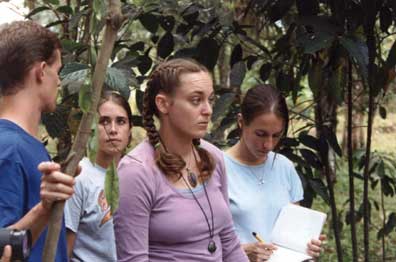
Volunteer decides to return home
Volunteer decides to return home
Englewood native left Africa after bouts with illness
By Mei-Ling Hopgood
From the Dayton Daily News
This was so daring, so different from anything she had known at Northmont High School or at the University of Dayton.
Kristen Sweetnich, who grew up in Englewood, sold everything she owned and lost 35 pounds so she could travel to Africa with the Peace Corps.
But within two months, Sweetnich lay in a clinic in the west African country of Togo with a 105-degree temperature, delirious with infection.
About 30 percent of volunteers never finish their two-year service, according to the Peace Corps, and most of those who leave do so within the first four months. Some get sick or become victims of crime. Some get frustrated with their jobs or the language or culture, or can't bear being thousands of miles from home. Of 38 volunteers sent to Togo with Sweetnich, at least six ended their service before she got sick for a final time in Africa, she said.
She would have to decide whether to end hers, too.
On Sept. 27, 2002, at age 23, Sweetnich left for Togo, a sliver of a country smaller than West Virginia and sandwiched between Ghana and Benin in west Africa. Although the Peace Corps provided only a 12-page booklet on Togo, she tried to prepare on her own.
In the weeks before she left, Sweetnich scoured the Internet and read a disheartening book about a Togo volunteer who had quit early. She also packed a newly purchased wardrobe of oversized clothing, hoping to avoid the sexual harassment she had read about.
In Togo, Sweetnich discovered a country where mountains and lush jungles green from the rainy season contrast with dusty, littered cities. She also discovered the harsh realities of the third world: the poverty, begging, stares, shouts of "Yovo!" (white), men who grabbed her breasts or buttocks. Still, she loved the family she lived with during training and looked forward to developing programs to help young girls in a developing country.
Then came the sickness.
During her first week in Togo, Sweetnich suffered from a minor bout of dysentery. Three weeks later an instructor took the volunteers to Sokode, a city in the country's interior, where volunteers were dropped off near street vendors hawking goods and food.
The Peace Corps warned the volunteers about buying food off the street, and Sweetnich, a vegetarian, did not eat the meat that had been sitting in the hot African air. But after eating rice and Gboma sauce made with spicy spinach, she got salmonella anyway, threw up for 12 hours straight and was put in a Peace Corps medical unit.
She recovered quickly, and resolved to stay healthy. But less than three weeks later, Sweetnich woke up at 4 a.m. with a 105-degree fever after contracting amoebic dysentery, a severe intestinal infection.
She called her Peace Corps medical officer and he told her to take a taxi for the two-hour ride from Kpalimé, where she was completing her training, to Lome, Togo's capital. Sweetnich stayed at the Peace Corps clinic for seven days. When her fever was down, she regained enough strength to e-mail her parents to let them know she had been in the hospital.
Sweetnich was torn. Training was almost finished. She liked her Togo family, though she had noticed they were stealing small sums of money from her. She was looking forward to her job at her post in Kpalimé.
But she had been sick virtually her entire eight weeks in Togo.
"At that point I just couldn't see myself living like that for two years and I decided to come home," she said. The Peace Corps supported her decision.
"It was my personal choice. I definitely could have stayed, but I didn't. I couldn't see how I could be productive, how I could help someone if I wasn't healthy myself."
The Peace Corps arranged for her flight home but told her she would have to find her own way to the airport in Lome. She also had to return what was left of her monthly stipend.
On Thanksgiving Day 2002, about two months to the day from when she left, Sweetnich came home to Ohio.
Now, she is working as a Children Services caseworker for Greene County and has started her graduate work in special education.
Sweetnich misses Africa. Her Peace Corps experience pushed her body and mind like nothing before.
"I guess I'm just frustrated with the whole experience," she said. "I still think about it every day."
